- Home
- Shirley Jackson
The Road Through the Wall Page 10
The Road Through the Wall Read online
Page 10
“We were busy that day,” Virginia said easily. “We were sorry too.”
“I was hoping to show you the apartment house.”
“Perhaps we can come another time,” Virginia said. For a minute Harriet was admiring Virginia’s facility, her good manners, and then a sudden thought came to her: she wants to go, Virginia wants to go see that Chinaman, she was mad when she couldn’t go, she really wants to go.
“I’ll see you later, Ginnie,” Harriet said. She started to walk away, but Virginia said, “Harriet, don’t be silly,” and Harriet stopped and turned. The Chinese man was looking at her, and he said, “I imagine I’m delaying you. You’re in a hurry.”
“No, of course not,” Harriet said foolishly. “We were just going for a walk.”
“Perhaps,” he said, turning again to Virginia, “perhaps you would like to come in for a few minutes now?”
Trapped, Harriet heard Virginia saying, “Thank you, we’d love to,” and realized that the Chinese man had turned back to the door and Virginia was following him. “Come on, Harriet,” Virginia said, “we’re going in.”
Harriet was thinking of two things at once: she couldn’t let Virginia go alone, not and ever be friends again afterward, but once inside they were no longer right where they could call for help. The two ideas merged stupidly. She ran after Virginia and whispered, while the man waited silently at the door, “We can’t go in, Ginnie. My mother.”
“You’re so silly,” Virginia said. “And you’re rude to whisper. Don’t come if you don’t want to.” She spoke out loud and Harriet was aware of the Chinese man looking at her quietly, aware of her bad manners. She followed Virginia miserably through the doorway and over to the elevator. The foyer of the apartment house was brightly muraled; tropical fish pursued one another insanely over and around doorways, gilt—still unchipped—lay lavishly on the ceilings and floors, and on the elevator doors two more orange fish, goggle-eyed, solemnly regarded the unwary passenger. Harriet followed mutely while Virginia and the Chinese man got into the elevator. Virginia was saying, “I don’t know why they paint fish all over everything.”
“I suppose they feel that a dark building needs to have cheerful decorations,” the Chinese man said. He pressed a button and the elevator began to move effortlessly upward; Harriet, crushed into a corner, watched the lines of floor slip by the little window in the elevator door; I can’t get out till it stops, she was thinking.
“What floor do you live on?” Virginia asked.
“Five,” he said. “The top.”
The elevator door opened and he led them out and down a long dark carpeted hall. Now we’re really far away, Harriet thought, probably there’s no one else home in the whole house. They stopped at the last door, and the Chinese man said, “By the way, my name is Lee,” and Virginia said, “I’m Virginia Donald and this is Harriet Merriam,” and he opened the door and they went in. For a minute Harriet lingered in the doorway, wondering if this were her last chance to get help, wondering what horrible thing this man and Virginia were conspiring against her.
Inside they found a living-room that might have been in the Merriams’ house, or the Donalds’ house. The furniture was the same, the pictures were similar and similarly placed, and the small kitchen just visible beyond might have housed the Donald flowered plates or the Desmond pressure cooker. Harriet sat down in an overstuffed chair that looked comfortably familiar, while Virginia went over to the window and said, “Look, how far down. Harriet, come look.”
The Chinese man disappeared into the kitchen, and Harriet whispered, “Ginnie, come here,” and when Virginia came over, Harriet whispered again, “Look, how do we get out of here?”
“Look,” Virginia said firmly, standing in front of Harriet with her hands on her hips, “look, this is lots of fun. You don’t have to go spoiling it all the time.”
She turned when the Chinese man came out of the kitchen carrying a tray. “I don’t know,” he said as he put the tray down on a coffee table in front of the couch and busied himself with glasses, “I don’t know if you young ladies are allowed to drink wine?” He looked up inquiringly, and Virginia said, “I’ve never had any.”
He gestured at the small bottle and the tiny thin glasses on the tray and said, “This is a very light wine, suitable for ladies.” He laughed comfortably and went on, “I know that ladies as young as you are not in the habit of drinking wine, but perhaps just a taste.” He poured a few drops into one of the tiny glasses and handed it to Virginia. When she took it she raised her eyes to him for a minute and then dropped them again, half-smiling. “I had tea ready for you on Tuesday,” he went on, “but today I had no time, of course, to get anything special.” He handed another small glass to Harriet, and she said, “Thank you,” in a very small voice. Then, in a minute, still talking, he passed her a dish of candy, and she took a piece of that and set it on the ashstand next to her, along with the little glass of wine. Her mind was not functioning, but her mouth, well-trained, said “Thank you,” automatically when someone handed her something.
Virginia tasted the wine and made a face, and Mr. Lee laughed and said, “This wine is made of rice; it is a Chinese wine.”
“It’s nice,” Virginia said. She looked at Harriet and said cruelly, “My friend was afraid to come up here.”
Mr. Lee was puzzled, and said, “I don’t know why. I very often have guests for tea.” He turned to Harriet and said very politely, “I hope you won’t be afraid to come any more. I hope you’ll come again.”
Harriet said, “Thank you,” again, almost inaudibly. After waiting for a minute Mr. Lee turned back to Virginia and said, “Do you go to school?”
Virginia made a gesture of distaste. “I don’t ever think about it in the summer,” she said.
“I had to go to a school to learn English when I first came to this country,” Mr. Lee said, as though he were beginning a story.
“You speak English awfully well,” Virginia said. She sipped at her wine again and finished the little bit he had given her. “May I have some more?” she asked. “It’s delicious.”
Mr. Lee hesitated before reaching out for her glass. “I’m not sure—” he said, and then stopped. When Virginia continued to hold out her glass, with a bright smile on her face, he took it finally and filled it with wine.
Virginia, sitting back with her full glass, said dreamily, “It must be wonderful to have a nice place like this, so high up over the street, and you just sit up here and drink wine and eat candy.”
Mr. Lee laughed and said, “I wish that were all I have to do.”
Virginia looked at the pictures on the walls and said, “Are you an artist?” and Mr. Lee laughed again and said, “No, if I had my choice I would be a writer, but as it is I do what I have to and make it as comfortable as possible.”
“What do you do?” Virginia asked.
Mr. Lee looked puzzled again. “I work here,” he said.
“What sort of work?”
“Why,” Mr. Lee turned his head to look at the kitchen. “I wash dishes, and mix drinks, and answer the door.”
“But is that all—” Virginia was saying, but Harriet cut in, saying abruptly, “Do you mean you’re the help here?” When Virginia looked sharply at her, Harriet said, “He’s the help, the maid. This isn’t his place at all.”
“Did you think it was?” Mr. Lee looked at Virginia and then at Harriet. “I couldn’t rent an apartment in this house,” he said. “Not in this neighborhood. They wouldn’t rent an apartment to me.”
Virginia stood up. “Thank you very much,” she said, “but we’d better be going.” She put her full wine glass down very carefully on the tray.
With the realization that no harm was going to come to her, Harriet remembered her conscious manners. “You were very nice to ask us to come,” she said. “I hope you won’t get into trouble for having guests up here.”
Perhaps Mr. Lee was angry with them, but he followed them politely to the door. “I am allowed to entertain my friends,” he told Harriet drily, and said to Virginia, “I’m sorry you have to leave.”
“Thank you very much,” Virginia said, and Harriet echoed, “Thank you very much.”
He closed the door after them as they went toward the elevator, and Harriet said, “I told you.”
“I didn’t know he worked there,” Virginia said. “How could I know? He never told us.”
“My mother will be furious,” Harriet said. “So will yours.” She thought for a minute and then said, “If they find out.”
“Don’t blame me,” Virginia said. “It’s not my fault.”
• • •
When Tod Donald came across the street after lunch to see if he could get Art Roberts to go to the movies that afternoon, there was a strange girl sitting on the Roberts’s front porch, and Tod stood for a minute at the foot of the walk before the girl looked up and saw him, and said, “Hi.” As Tod came slowly up the walk she watched him, and when, he came close enough she said, “You looking for someone?”
She had a big head, big like a movie close-up, because her mouth and eyes and nose were all big, and her hair fell down straightly around her face, and the hair itself was almost orange. She seemed to be small and thin, otherwise, and Tod was not so much confused by her when he came close, and she spoke to him with her large mouth, and her voice was pleasant. “I’m looking for Art,” he said. “Artie Roberts.”
She jerked her head at the Roberts house in back of her. “You mean one of them?” she asked. “They’ve all gone out.”
“Where did they go?” Whenever Tod had saved a little money from his allowance he would ask Pat Byrne or Art Roberts to go to the movies or down for a soda with him, his treat; that way, although they never asked him in return, he had at least their society for a while, and sometimes even overt friendly gestures from them. However, if Art and Pat were together, there was no use in Tod’s asking either or both of them to go with him; he could have afforded, today, to take them both to the movies, but he could not bear being the lonely third, the butt of their laughter while he paid for their tickets.
“He’s not home,” the girl said, and after a minute Tod realized that she meant Mr. Roberts. “The boys have both gone out somewhere to play, and she went to the store. Would I be sitting out here,” she demanded suddenly of the vacant air beside her, “if she was around? No, I would not. I would be inside working my ass off while I had to listen to her troubles.” She looked fiercely at Tod and continued, “Do you know what happened to her fat little hand this morning? She burned it on the stove, that’s what she did. It nearly ruined the rest of her life. So now she stands over me while I burn my damfool arms off and all the time she’s talking about how there’s so much work she just can’t do it all herself and she’s unhappy with her husband and I’m to be very careful about not offending him. Me offend him!”
It became somehow clear to Tod that this last sentiment was admirable to the girl, and he smiled reassuringly. “Of course not,” he said feebly.
“I saw him down at school one night,” the girl said. “One night he came down when his lousy son was in that lousy play they had. I saw him.” She stopped meaningfully.
Her hair is dyed, Tod thought, appalled. Emphatically dyed. It was positively black close to her head, and then it became suddenly, dreadfully orange. Dyed. He wanted to touch it.
“Who are you?” the girl said suddenly.
Trying to remember, Tod could only think about her hair.
“You’re Jim Donald’s kid brother,” she decided. “I know Jim.”
“Why do you dye your hair?” Tod asked unexpectedly. He would never have asked if she had not identified him with Jim.
She frowned at him, bringing her big eyebrows together over her big eyes, and twisting her big mouth with contempt. “It’s not dyed,” she said. “That’s a hell of a thing to say. It’s natural.” She touched it affectionately and then stood up suddenly.
Tod felt an arm around his shoulders, an unfamiliar, possessive arm. It was tight and did not belong around him, and he turned around to find Mrs. Roberts’s head above him, her arm determinedly around him.
“Did you finish the dishes, Hester?” Mrs. Roberts asked icily. “Is the living-room dusted? If I neglected to give you enough work to keep you occupied—” Mrs. Roberts’s fury took her breath away, and she stopped.
Hester said meekly, “I didn’t quite finish. I came outside for a minute.”
“This little boy,” Mrs. Roberts said, “is the son of one of my friends. He is not one of your charges. I introduced you to my sons this morning.”
“Yes, Mrs. Roberts,” Hester said. She turned and went back into the house, and Mrs. Roberts took her arm away from Tod and followed, without speaking to him.
Tod moved back across the street disconsolately. He could still feel the taut pressure of Mrs. Roberts’s arm across his shoulders; it was the first time Mrs. Roberts had ever put her arm around him.
• • •
“Back at last, are you?” Mrs. Mack said. She held the door open wider and her dog Lady trotted in with a guilty sideways look at her; Lady was big and slow-moving, and his usually clean brown fur was, tonight, streaked and daubed with mud, the white spot at his throat almost hidden. “Back at last,” Mrs. Mack said. “Well, sit down, then, I’ve kept your dinner.”
The dog, still guilty, leaped as unostentatiously as possible into a chair by the table, and Mrs. Mack went on, as she put the plates down, “Nothing’s got cold, because I kept it warming for you, but if it’s dried out you’ve got yourself to blame.” She looked severely down at the dog for a minute, and the dog, not touching the food, only looked back at her until Mrs. Mack smiled involuntarily and said, “Well, then, I’m not angry. Go, eat your dinner.” She patted the dog on the head, and the dog, with signs of infinite relief, licked her hand, wagged his tail, and began to eat greedily from the plate. When the dog put a paw on the table Mrs. Mack slapped the paw and said, “Will you never remember?” and the dog took the paw down again hastily.
Although no one had been inside Mrs. Mack’s house in the years since her husband’s death, the two rooms in which she and the dog lived were kept clean and swept. The grey little house, so rotten and tottering outside, held, inside, a faded set of overstuffed chairs and sofa, a polished wood-burning stove, and, in the bedroom where Mrs. Mack and Lady slept, an old-fashioned mahogany bedroom set, with a glass of fresh dandelions in front of Mr. Mack’s picture on the dresser. Lady sat in a plain kitchen chair at the table, and while he ate his dinner Mrs. Mack resumed work on the crocheted rag rug of astronomic proportions which was to go on the bedroom floor.
“Look,” Mrs. Mack said to Lady, “not far to go now.” She spread the rag rug over her lap on to the floor, and Lady regarded it with interest.
“It is pretty,” Mrs. Mack said, as though agreeing with the dog’s opinion. “I’ll be glad when it’s finished and we have a warm floor.”
“Are you finished?” Mrs. Mack asked the dog, leaning over to look at the plate. “Aren’t you going to have your tomato? I picked it only this afternoon.” When the dog made no move, Mrs. Mack said, “Well, then, if you won’t there’s no making you,” and she rose and carried the plate over to a low shelf where her dishpan stood, next to the small cabinet in which were the flowered dishes she and Lady used. She poured hot water into the dishpan from the kettle on the stove, and washed and dried the dog’s plate while she said, conversationally, “I don’t know as there’s any use, really, in growing tomatoes if you won’t learn to like them. They don’t please me enough to eat them all alone, and even one tomato plant brings more than I can eat in a summer.” The dog slipped down from his chair to move to one of the upholstered chairs, where he curled up comfortably, watching Mrs. Mack while she w
orked. “I suppose there’s no use asking you where you’ve been?” Mrs. Mack said. She looked anxiously at the dog, but the dog turned his face away from her, and she said, “Well, when you’re ready you’ll tell me. I won’t be angry, I promise you.”
When the dish was washed and put away—all Mrs. Mack’s movements were slow and cautious, and it took her almost a minute to set the plate down correctly, so that it would not jar its fellows—Mrs. Mack picked up the kerosene lamp from the dinner table and brought it over to set it on a small table next to the sofa. The weak light from the lamp could be seen only dimly from the Desmond house or the Byrne house, on either side of Mrs. Mack’s house, because, although Mrs. Mack’s windows were neatly curtained on the inside, they were covered with newspaper outside. Mrs. Mack turned the lamp up a little higher, and settled down with a sigh in the corner of the sofa. “It’s a nice quiet night,” she said. “No wind.” Then she sighed again, and said, “Well.”
She took a book from the table where the lamp stood, and said, “I want to go to bed soon, so we’ll have an early lesson tonight.” She opened the book to the place where the bookmark lay, and, running her finger down the page as she read, she began, “‘Therefore is judgment far from us, neither doth justice overtake us; we wait for light, but behold obscurity; for brightness, but we walk in darkness. We grope for the wall like the blind, and we grope as if we had no eyes: we stumble at noonday as in the night; we are in desolate places as dead men. We roar all like bears, and mourn sore like doves: we look for judgment, but there is none; for salvation, but it is far off from us.’ That means,” she said to the watching dog, letting the book lie open in her lap, “that means, let me see. Obscurity, that’s when it gets dark. Desolate, that means there’s nothing there. You see,” she went on eagerly to the dog, “we are all evil blind people. Salvation means some way out. You see,” she said again, “the Lord is watching us all the time, and watching for every thing we do that is bad, because the Lord won’t stand for anything that’s bad.” With the book still open on her lap she fell into brooding thought, her fingers moving slowly up and down the edge of the book’s cover. The dog waited patiently for a little while and then dropped his head on his paws and closed his eyes.

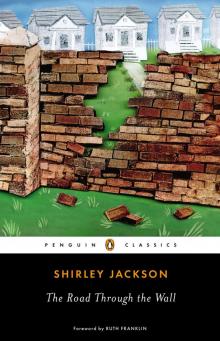 The Road Through the Wall
The Road Through the Wall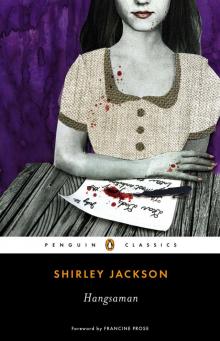 Hangsaman
Hangsaman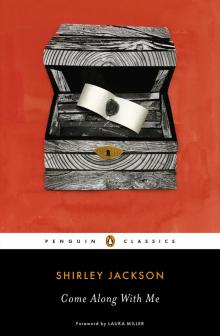 Come Along With Me
Come Along With Me The Lottery
The Lottery Just an Ordinary Day: Stories
Just an Ordinary Day: Stories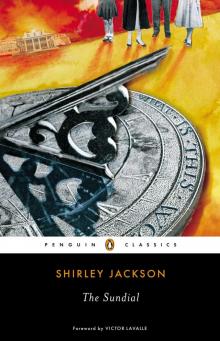 The Sundial
The Sundial Dark Tales
Dark Tales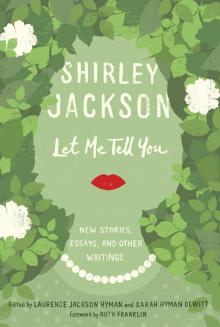 Let Me Tell You: New Stories, Essays, and Other Writings
Let Me Tell You: New Stories, Essays, and Other Writings The Haunting of Hill House
The Haunting of Hill House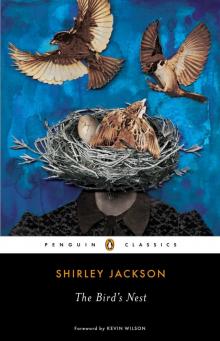 The Bird's Nest
The Bird's Nest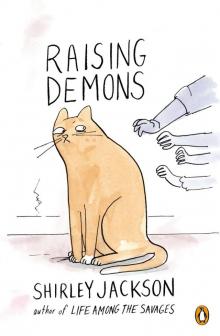 Raising Demons
Raising Demons We Have Always Lived in the Castle
We Have Always Lived in the Castle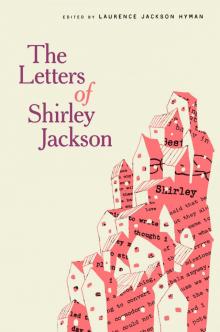 The Letters of Shirley Jackson
The Letters of Shirley Jackson The Missing Girl
The Missing Girl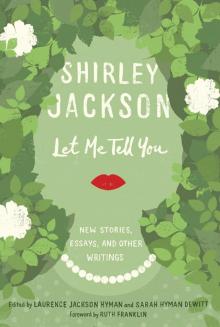 Let Me Tell You
Let Me Tell You